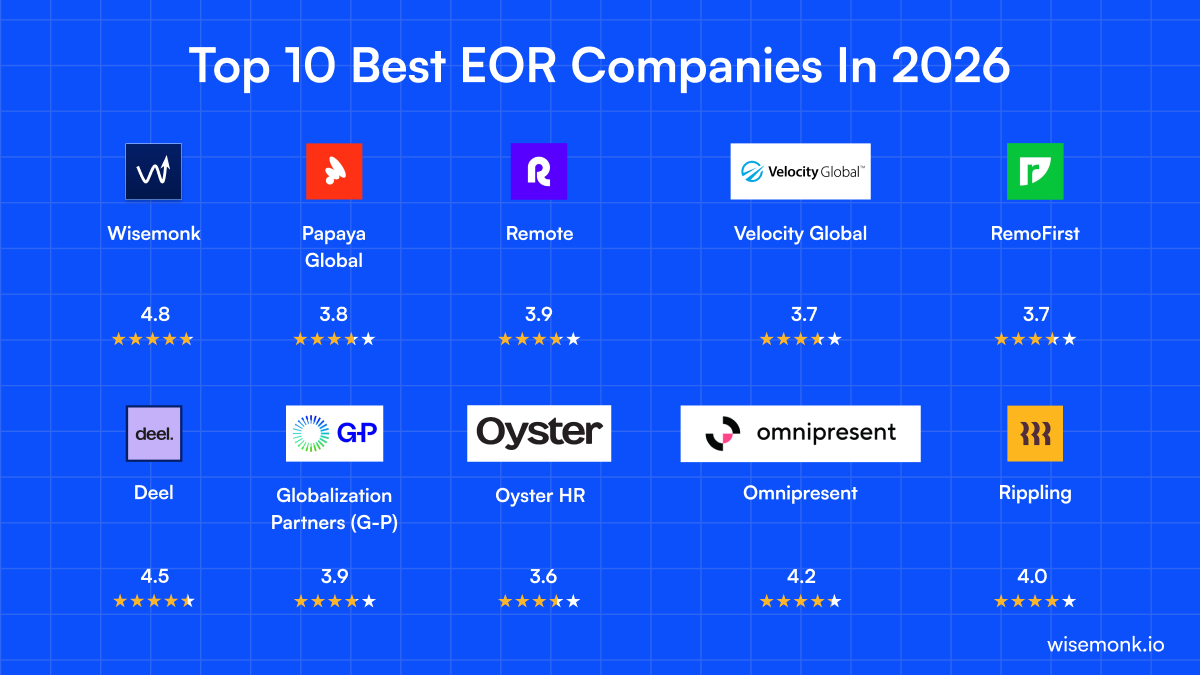Looking to hire top talent in Malaysia without the complexity of establishing a local entity? An employer of record Malaysia service allows you to seamlessly onboard Malaysian employees, manage payroll processing, and ensure legal compliance with local labor laws, while you focus on business growth. In our experience guiding global companies, the EOR model streamlines employment contracts, employment benefits, and statutory contributions like EPF and SOCSO for both foreign and local employees, minimizing legal risks and administrative burdens.
In this guide, we will explore local employment laws, EPF and SOCSO contributions, Malaysia EOR costs, and practical steps for compliant and efficient hiring across Kuala Lumpur and Malaysia.
What is the Malaysian employment law framework?[toc=Employment Law Framework]
Malaysia’s employment laws provide a robust framework that enables both local and foreign employers to hire talent smoothly while ensuring full compliance with complex labor regulations. Here are the core regulations and procedures you need to know for compliant hiring in Malaysia:
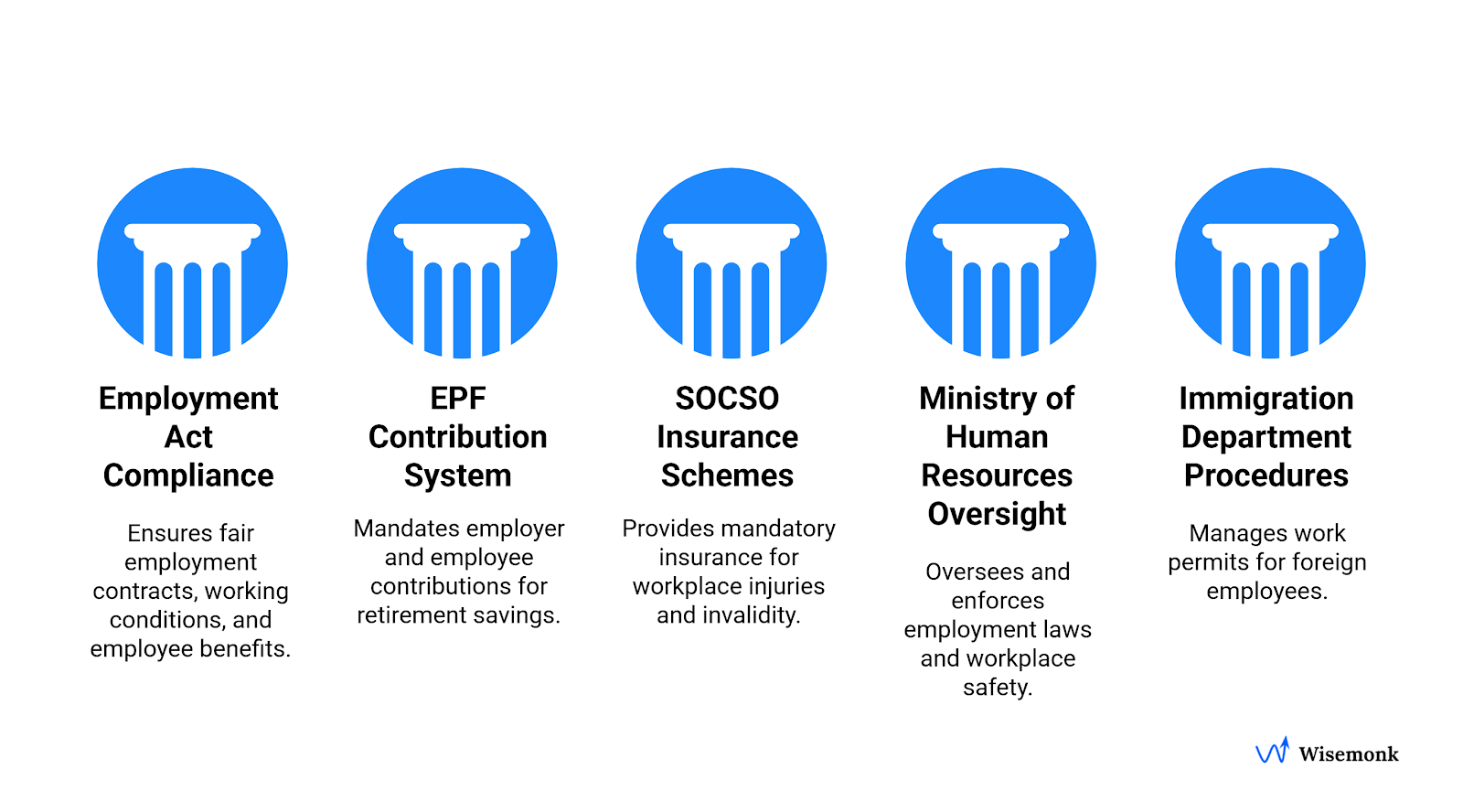
- Employment Act 1955 Compliance Requirements: The Act sets the standards for employment contracts, job scope, basic salary (minimum RM1,700/month from February 2025), working hours (max 45 per week), annual leave, sick leave, rest days, and maternity allowance (at least 98 days). Overtime pay and fair dismissal are also required. Updates now extend coverage to all employees, with flexible work and gig worker protections included.
- Employees Provident Fund (EPF) Contribution System: Employers must contribute 13% (or 12% for gross monthly wages above RM5,000) and employees contribute 11%. From October 2025, foreign employees with valid employment passes must also contribute a reduced rate of 2% each (employer and employee). EPF contributions must include fixed allowances.
- Social Security Organisation (SOCSO) Insurance Schemes: SOCSO is mandatory for most employees (excluding domestic staff). Employers contribute 1.75% and employees 0.75% of wages, with the contribution ceiling raised to RM6,000 from October 2024. Registration is required within 30 days, and coverage includes workplace injuries and invalidity. Foreign workers under 60 now receive full coverage.
- Ministry of Human Resources Oversight: The Ministry of Human Resources (KESUMA) regularly updates and enforces employment laws, workplace safety, and industrial relations. Keeping up with new flexible work and anti-harassment rules is essential for every employer of record Malaysia provider.
- Immigration Department Work Permit Procedures: Foreign employees must have valid work permits from the Immigration Department. Employers secure quota approval and apply via digital platforms (MYXpats/ESD) with full documentation. Permits are tied to the specific job and employer; formal notification is needed for any changes.
This framework ensures that employment agreements, payroll processing, statutory benefits administration (EPF, SOCSO, EIS), and workplace safety are all standardized, minimizing legal risks and supporting a fair employment landscape for both Malaysian and foreign employees.
What are the key benefits of Malaysian EOR services?[toc=Key Benefits]
Looking for a smooth way to expand in Southeast Asia? In our experience helping international clients, an employer of record Malaysia solution offers these stand-out advantages:
- Strategic ASEAN Market Entry Point: Malaysia’s central location and ASEAN Free Trade membership give your business access to over 600 million consumers and easy connections to neighboring markets like Singapore, Thailand, and Indonesia. With an EOR, foreign companies can hire staff locally without setting up a legal entity.
- Cost-Effective Access to Skilled Workforce: Malaysian EORs streamline the hiring process and handle payroll processing, tax withholdings, and compliance, helping you onboard qualified Malaysian employees and foreign workers quickly while keeping costs low.
- Navigation of Government Incentive Programs: Malaysia provides robust tax incentives and grants, including Pioneer Status and Investment Tax Allowances, for digital, manufacturing, and green sectors. EOR providers help you tap into these benefits and stay in line with local regulations.
- Multicultural and Multilingual Talent Pool: Malaysia’s diverse workforce, skilled in English, Malay, Chinese, and Tamil, ensures global communication and innovation, fostering a flexible, inclusive team culture for your business.
- Regional Distribution Hub Advantages: With modern logistics, free trade zones, and strategic ports, Malaysia is a go-to base for efficient regional supply chain management and fast e-commerce distribution across ASEAN.
These advantages make Malaysian EOR services a smart, efficient, and compliant choice for companies aiming for rapid and sustainable expansion in Southeast Asia.
How do Malaysian EOR operations function?[toc=How EOR Functions]
Curious how an employer of record Malaysia service handles all the hiring complexities? Based on our extensive research and hands-on experience, here’s a clear snapshot of how EOR operations make business expansion seamless and compliant:
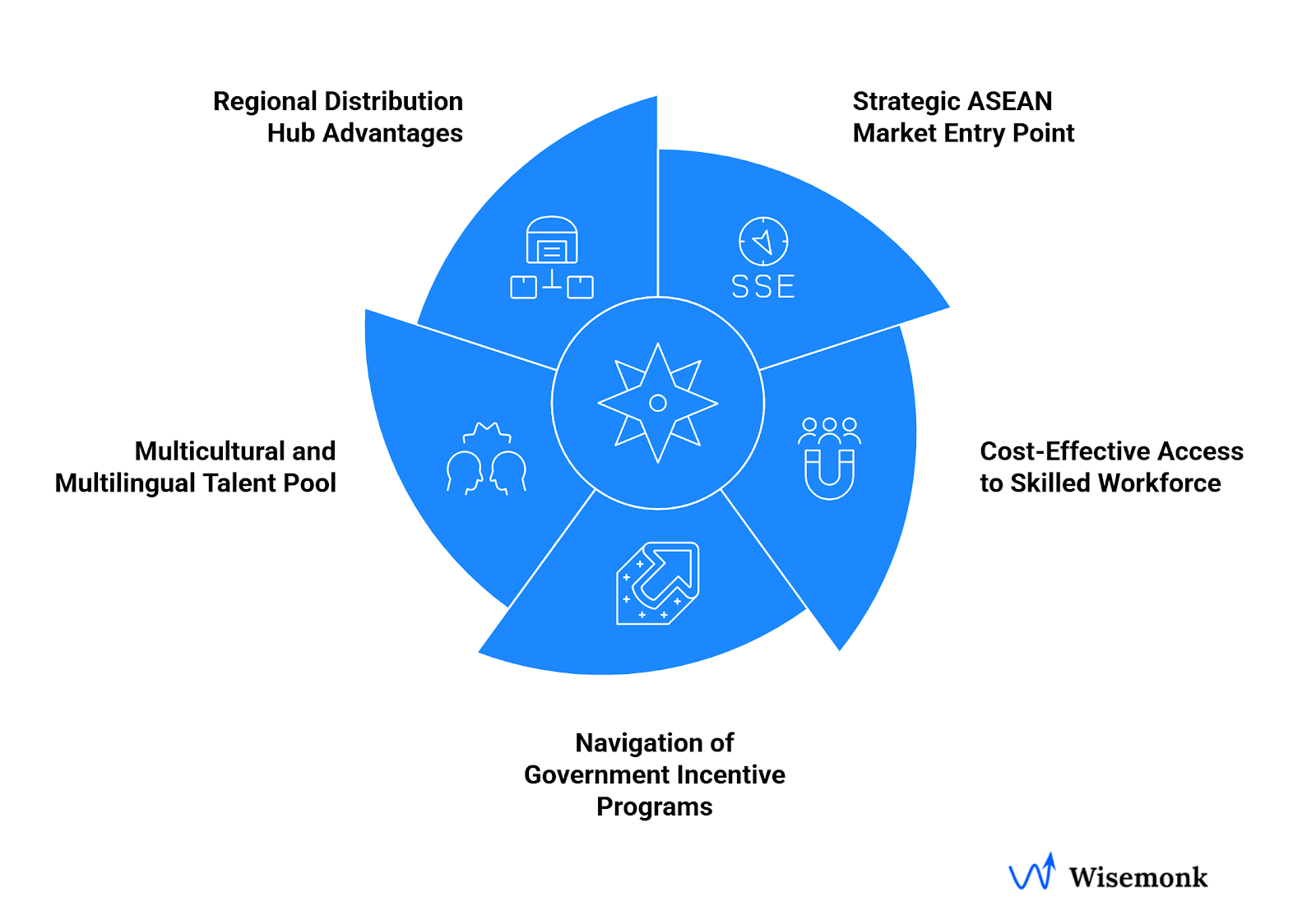
- Employee Onboarding & Employment Act Compliance: A Malaysia EOR drafts compliant employment contracts, manages work permit applications, and registers staff for statutory benefits. New hires are onboarded quickly, with all employment agreements, job scopes, and HR policies in line with the Malaysian Employment Act and local labor laws.
- Monthly Payroll Processing in MYR: The EOR accurately manages payroll processing in Malaysian Ringgit, including salary payments, overtime, and deductions for benefits and taxes. All statutory withholdings, such as income tax, EPF, and SOCSO contributions, are calculated and submitted on time, ensuring payroll compliance for both local and foreign employees.
- EPF and SOCSO Contributions Management: EOR services enroll all eligible staff in the Employees Provident Fund (EPF) and Social Security Organization (SOCSO). EPF contributions are 12–13% for employers and 11% for employees (with specific rules for foreigners and senior workers). SOCSO coverage protects against workplace injury and invalidity, with updated requirements now covering foreign workers too.
- Annual Leave & Public Holiday Administration: EORs manage leave entitlements, public holiday schedules, and statutory annual and sick leave, ensuring every employment agreement stays compliant with evolving local labor regulations. Proper management reduces disputes and keeps employee benefits transparent and fair.
- Performance Reviews & Employee Relations: An employer of record supports performance appraisals, continuous feedback, and regular policy updates for Malaysian employees. They provide HR support to resolve issues, maintain employment compliance, and ensure healthy employer-employee relations throughout the hiring process.
By letting a Malaysian EOR handle these core operational duties, your business gains deep local knowledge and expertise, robust payroll systems, and full compliance with Malaysian law, freeing you to focus on strategic growth and team success.
What Malaysia-specific EOR considerations should employers know?[toc=Key Considerations]
Navigating employer of record Malaysia solutions means paying close attention to local employment laws, payroll management, and cultural factors. Here’s what truly matters for compliant hiring:
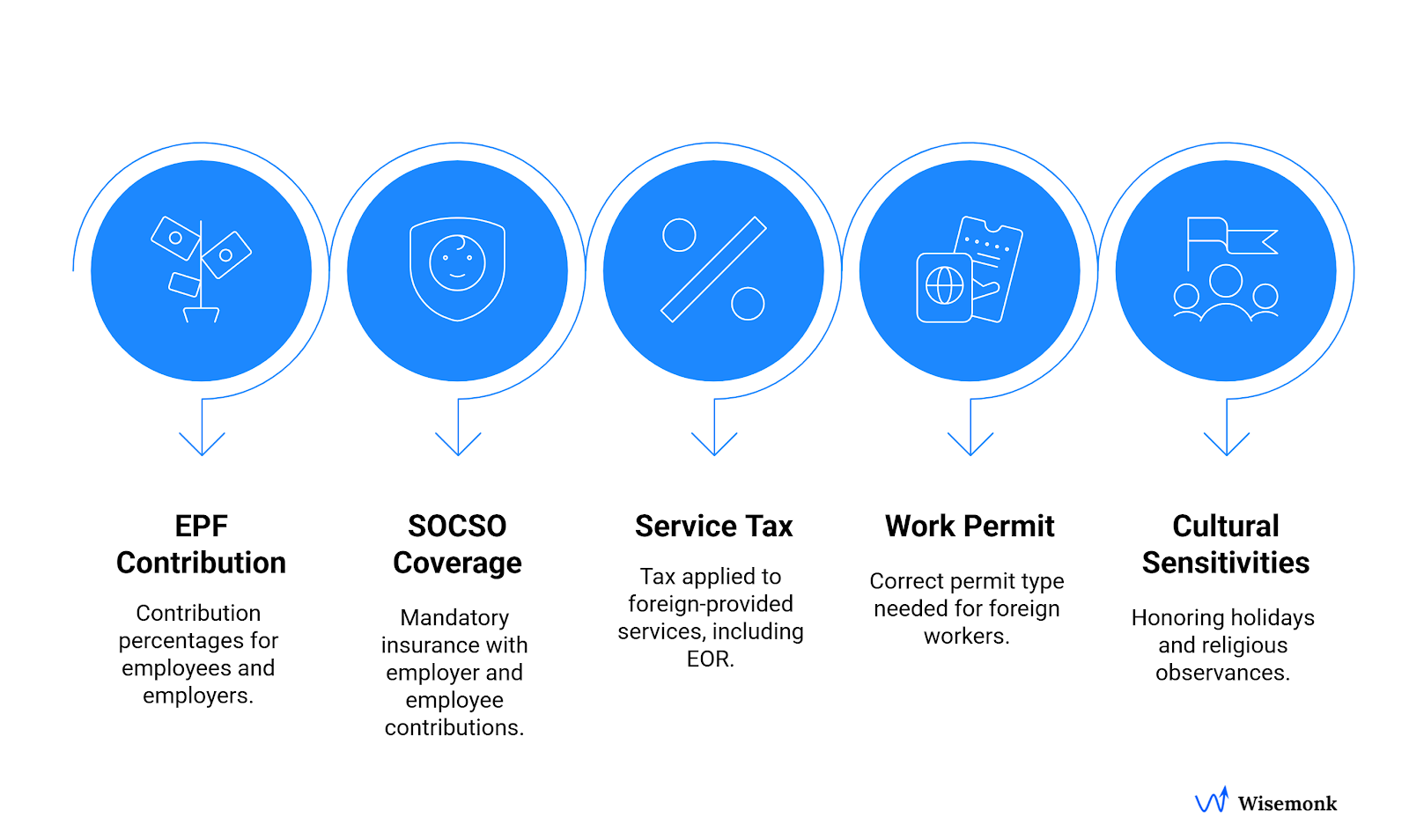
- EPF Contribution Rates: As of October 2025, employees and permanent residents contribute 11% and employers 12–13% to EPF; foreign workers with valid passes must now contribute 2% each.
- SOCSO Coverage: SOCSO insurance is mandatory (employer 1.75%, employee 0.75%, wage ceiling RM6,000/month from October 2024). Register staff within 30 days; coverage now includes foreign workers under 60.
- Service Tax on Foreign Services: An 8% service tax applies to most foreign-provided services, including EOR, unless exempt. Confirm tax obligations with every EOR provider.
- Work Permit Rules: Foreign workers need the correct permit type: Employment Pass, Temporary Employment Pass, or Professional Visit Pass. Renewals require prompt online applications, valid contracts, medical exams, and no immigration violations.
- Cultural Sensitivities: Honor public holidays and religious observances (e.g., Hari Raya, Deepavali), provide prayer facilities, and allow flexible leave, Malaysian law protects these rights for all employees.
Understanding these local employment regulations, statutory contributions, tax rules, and cultural practices supports legal compliance and happier teams throughout Malaysia.
How to select a Malaysian Employer of Record service provider?[toc=How to Choose Right EOR]
Choosing the right employer of record Malaysia partner is crucial for legal compliance, smooth hiring, and long-term business growth. Here’s what our experience and research suggest you look for:
- Expertise in the Employment Act and Local Knowledge
Top EOR providers are well-versed in Malaysia’s Employment Act 1955 and related labor laws. This ensures all employment contracts, workplace policies, and HR practices are tailored for strict legal compliance. Local expertise is key for understanding cultural nuances, holiday calendars, and industry regulations. - EPF and SOCSO Administration Experience
Your EOR must efficiently manage Employees Provident Fund (EPF) and Social Security Organisation (SOCSO) registrations, monthly payroll deductions, and statutory filings. A reliable provider keeps up-to-date with changing rates, deadlines, and reporting methods, reducing risks of errors or late payments. - Immigration Services and Work Permit Support
Handling visas and work permits for foreign employees requires specialist knowledge. Look for EORs skilled in quota approvals, digital applications (MYXpats/ESD), permit renewals, and strict record-keeping. Fast, accurate support here keeps your team fully legal and avoids costly delays. - Technology Platform Capabilities for MYR Payroll
Leading EORs invest in robust payroll platforms to process salaries in Malaysian Ringgit (MYR), manage statutory withholdings, and automate compliance reporting. Payroll tech should integrate with HR systems, provide real-time law change updates, and allow both you and your employees easy access to pay and benefits records. - Experience with Manufacturing & Services Sectors
Industry experience matters. If you’re in manufacturing, logistics, or services, ensure your EOR understands sector-specific legal requirements, shift patterns, and safety protocols. They should offer case studies or references showcasing success in fields similar to yours.
Based on our extensive work guiding global expansions, selecting an EOR service provider with proven local compliance, payroll expertise, and sector familiarity ensures stress-free market entry and business growth.
How do EOR costs compare to setting up a Malaysian entity?[toc=Cost Analysis]
Understanding the cost differences between using a Malaysian employer of record (EOR) service and establishing a local entity is vital for choosing the best option for your business stage. Here’s a straightforward comparison to help you make informed decisions about your Malaysia hiring strategy.
What are the latest Malaysian EOR market trends?[toc=Market Trends]
Malaysia’s employer of record (EOR) landscape is rapidly evolving in 2025, shaped by digital transformation, booming e-commerce, and regional integration. Here’s what stands out, based on recent government and industry data:
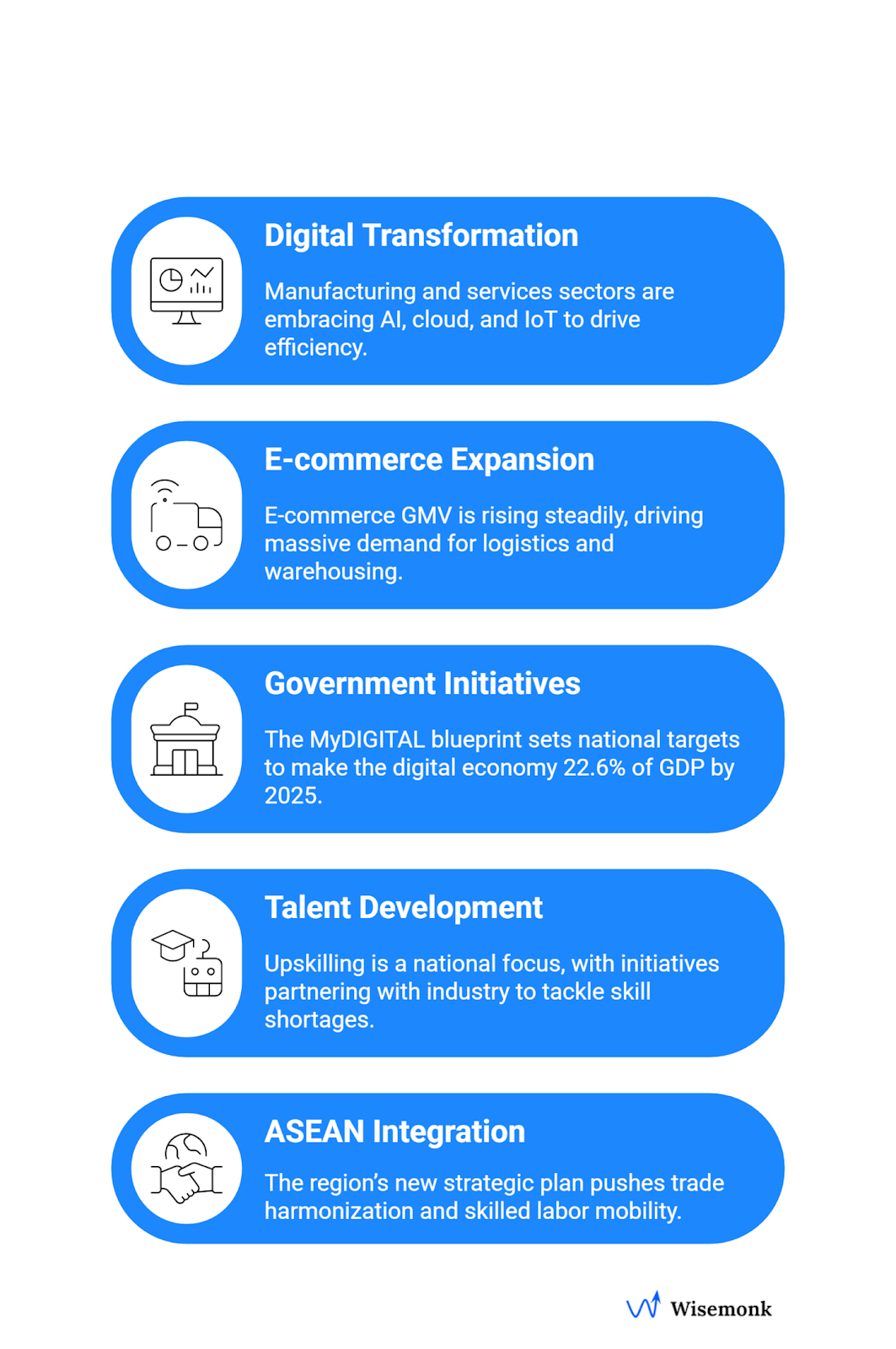
- Digital transformation: Manufacturing and services sectors are embracing AI, cloud, and IoT to drive efficiency, automation, and data-driven decision making. The digital transformation market in Malaysia is growing at nearly 19% annually, reaching over $10 billion, with smart factories and agile workflows becoming the norm.
- E-commerce and logistics sector expansion: E-commerce GMV is rising steadily, driving massive demand for logistics, third-party warehousing, and distribution hubs. Malaysia’s logistics market is valued at nearly $30 billion in 2025, supported by modern infrastructure and high internet penetration.
- Government digitalization initiatives: The MyDIGITAL blueprint and Malaysia Digital Economy Blueprint set national targets to make the digital economy 22.6% of GDP by 2025, create 500,000 jobs, and ensure 100% digital literacy for civil servants. The government is also scaling up AI, cybersecurity, and SME incentives for digital adoption.
- Talent development and upskilling programs: Upskilling is a national focus, with initiatives like K-Youth and vocational training centers partnering with industry to tackle skill shortages in tech, manufacturing, and digital services. Programs prioritize hands-on learning, certifications, and fast job placement for young Malaysians.
- ASEAN economic integration impacts: The region’s new strategic plan pushes trade harmonization, skilled labor mobility, and deeper economic ties. Malaysia’s EOR services are benefiting, enabling foreign firms to hire and relocate workers region-wide as ASEAN targets becoming the world’s fourth-largest economy by 2045.
These market trends show Malaysia strengthening its role as a digital, logistics, and talent powerhouse, making employer of record Malaysia solutions increasingly vital for efficient, forward-looking business expansion.
Conclusion[toc=Conclusion]
In our experience, choosing an employer of record Malaysia solution gives you fast, compliant hiring and easy access to ASEAN’s vast market, without the hassle of setting up a local entity. EORs handle payroll, contracts, and benefits, letting you scale quickly while staying on top of Malaysia’s evolving labor laws. For the best results, pick a provider with local expertise, clear fees, strong tech, and transparent processes. Start small, test the waters, and grow as your business needs. This flexible model is the smartest, safest way to expand in Malaysia and across Southeast Asia.
Ready to expand your global business quickly and compliantly? Partner with Wisemonk’s Employer of Record services to effortlessly manage hiring, payroll, and compliance, so you can focus on growing your business with confidence.
Frequently asked questions
What are the EPF and SOCSO contribution requirements in Malaysia?
Malaysian and PR employees contribute 11% and employers 12–13% to the EPF; from October 2025, foreign workers and their employers each contribute 2%. For SOCSO, employers contribute 1.75% and employees 0.75% of wages (capped at RM6,000/month as of October 2024), including eligible foreign workers.
How long does it take to get work permits through EOR in Malaysia?
Getting a work permit via an EOR generally takes 4–8 weeks from submitting complete documents to permit approval and employee onboarding; delays can occur if documentation is incomplete.
What government incentives are available for foreign companies using EOR?
Foreign companies in Malaysia can access incentives like Pioneer Status (partial or full tax exemption for 5 years), Investment Tax Allowance, and special tax rates or sector grants for digital, manufacturing, and targeted industries.
How does Malaysia EOR support ASEAN regional expansion?
A Malaysian EOR enables rapid hiring and compliance without entity setup, leveraging ASEAN trade agreements and seamless mobility to expand into Southeast Asian markets more efficiently.
What are the cultural considerations when hiring in Malaysia through EOR?
Malaysia’s workforce is multicultural, and employers should accommodate religious observances, honor public holidays, and foster respectful communication and inclusion to build a productive, harmonious team.
Is employer on record legal in Malaysia?
Yes, Employer of Record (EOR) services are legal in Malaysia. Foreign companies can partner with an EOR to hire employees without establishing a local entity. The EOR becomes the legal employer, handling payroll, tax contributions, benefits, and compliance with Malaysian labor laws, while the client company manages day-to-day work.
Who benefits from EOR services in Malaysia?
Startups, SMEs, and multinational companies expanding into Malaysia benefit from EOR services. It’s especially useful for businesses testing the Malaysian market, hiring remote teams, or managing contractors compliantly.
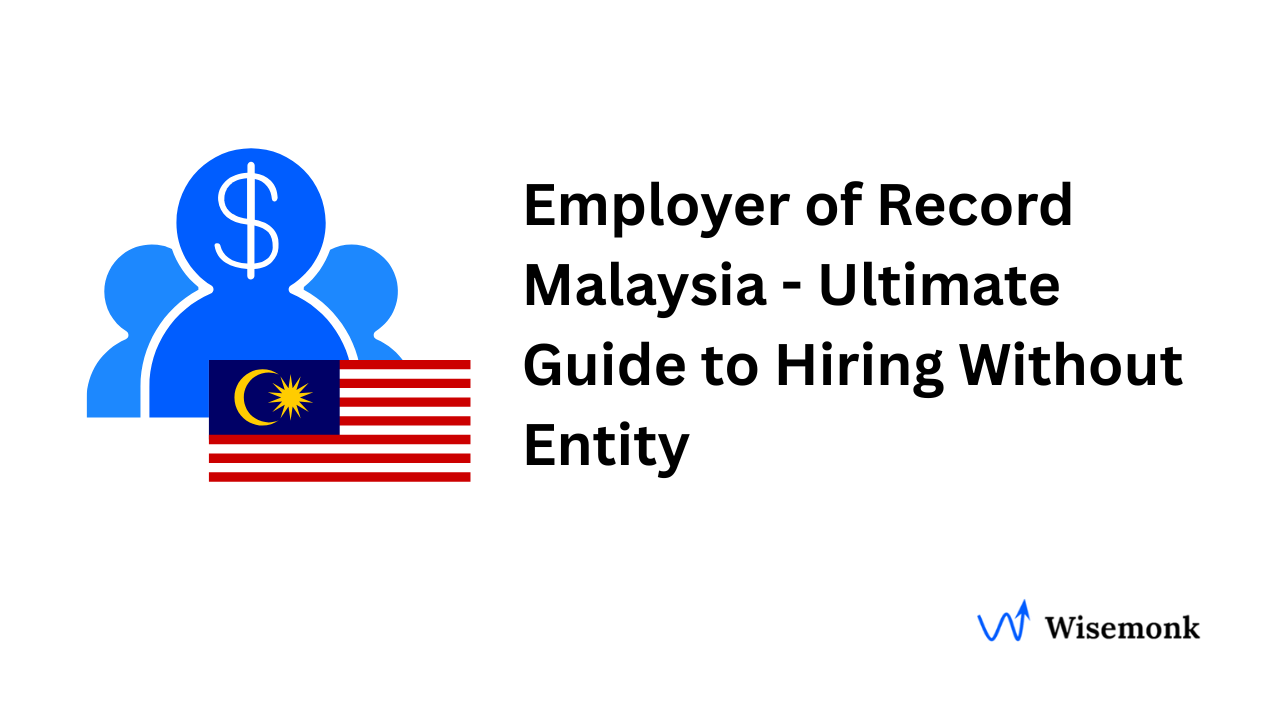
.png)
%20(1).webp)
